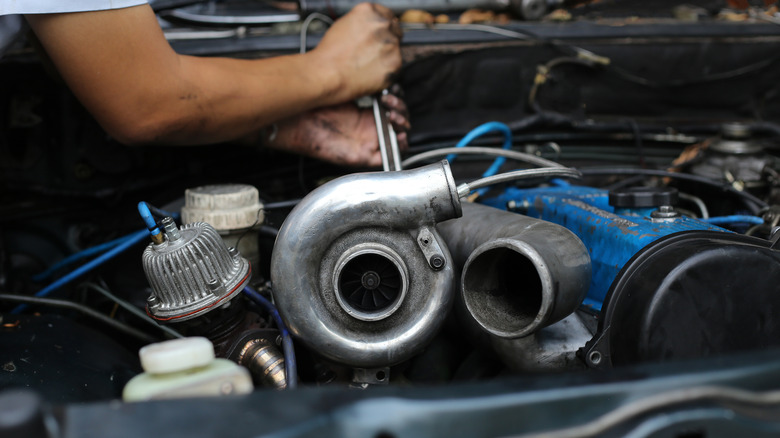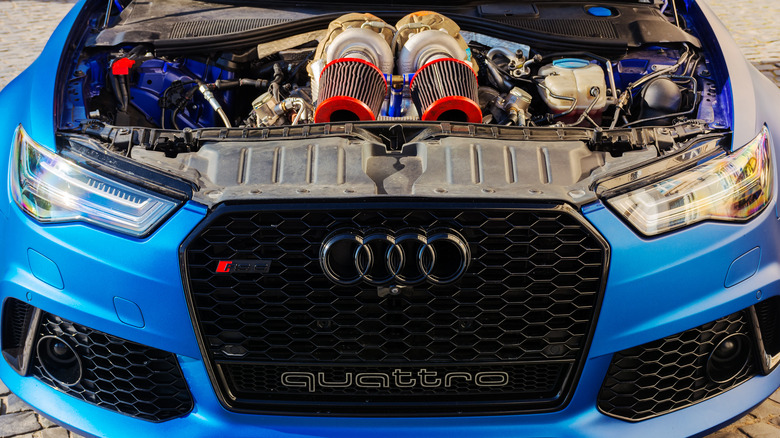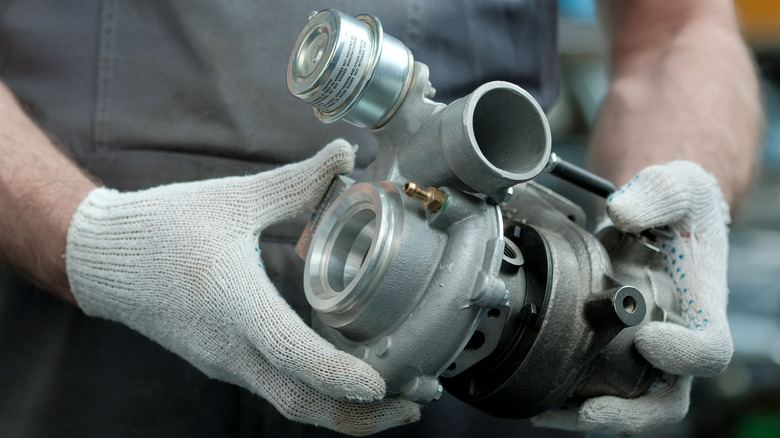Can Turbos Increase Your Car's MPG? It's Complicated
Turbochargers are a fantastic way of boosting your engine's performance. But does a turbo also boost your car's MPG? The answer is more complicated than you may think. To understand turbos and their role in fuel efficiency, it's useful to have a look at their history and the reason they were developed. Despite being a relative newcomer to our road vehicles — Oldsmobile's strange F-85 Jetfire engine is one of the first examples – the turbo can trace its roots right back to the 19th century. This was when Gottlieb Daimler and Rudolf Diesel, two of the biggest names in automobile history, began to look at the concept. The premise was simple, to improve engine performance by using the exhaust gases to spin a turbine to force more air into an engine's cylinders.
It all boils down to one thing: Power. The added air (and fuel) allows more combustible mix to be added to the cylinders. By doing this, a turbocharger transforms engine performance and allows smaller engines to punch above their weight in power terms. So yes, a turbo can make a downsized four feel like a V6, but whether it actually drinks less fuel is a question only physics (and your right foot) can answer. In short, a turbo might boost your MPG, but not always. Let's have a closer look at the factors that determine whether a turbo is just a performance booster, an economy champion, or both.
Turbochargers: Power or efficiency?
Let's look at one scenario that would suggest that turbochargers are indeed a fuel saving addition to an engine. Turbocharging allows manufacturers to put smaller engines in their vehicles without compromising on power. What do smaller engines generally mean? Better fuel economy. There are plenty of variables that can affect just how big this saving is, but a general consensus is that a turbocharged engine can reduce fuel consumption by between 2% and 6%. However, all this tells us is that a smaller turbocharged engine will burn less fuel than a bigger similarly performing engine. What it doesn't tell us is whether the same small engine would be more efficient without that power-boosting turbo. However, even this is more complicated than you think.
The answer doesn't just lie in the facts on a laboratory dyno chart. It lies in the real world of traffic lights, snarled traffic jams, and just how keen the driver is to feel that surge of power as the turbo works its magic. In the end, turbos can't defy physics. More power still demands more fuel, and whether your turbo engine is an MPG saver or a power-hungry raver depends on how and where you drive. The good news is that there are some simple steps you can take to make sure that your turbo is working for fuel efficiency and not against it.
How to get the best MPG from your turbocharged engine
Whether you're running a big engine or a small turbocharged engine, the equation remains the same — more horsepower requires more fuel. In terms of turbochargers, the increase in the amount of air supplied to the combustion chamber will require more fuel to keep the combustion mixture at the correct ratio. What this means is that the gentler you are with the gas and brake pedals, the better your fuel consumption will be. This fact can hardly be considered rocket science and the exact same premise could be applied to any engine. However, there are a couple of turbo-specific steps that can help to achieve a better MPG rating.
One way is to get the engine tuned for maximum efficiency. This would generally involve manipulating the Engine Control Unit (ECU) to optimize it for better fuel economy. Unless you're comfortable with ECU software, then this step is best left to tuning professionals. Another way of improving the efficiency of a turbocharger is proper maintenance. Modern turbos spin at over 150,000 rpm and cope with incredibly hot exhaust gases (1,472 Fahrenheit in some diesel engines). With these performance levels, the proper maintenance and the correct lubricants can greatly boost the fuel efficiency of a turbocharged engine. Regular oil, oil filter, and air filter changes done following the manufacturer's instructions are some basic steps that can help to keep your engine running efficiently. In addition, it can also prolong the life of your turbocharger. Always a worthwhile boost!


